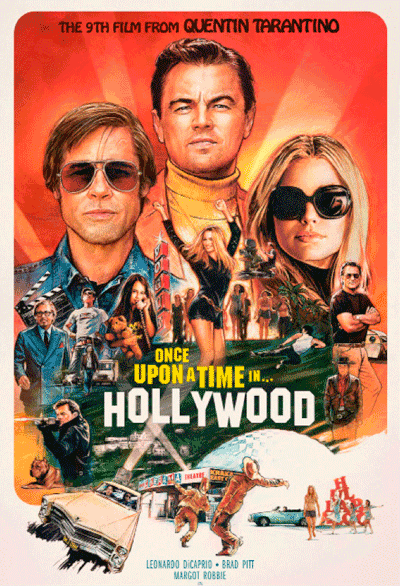Movie Review: Once Upon a Time in Hollywood
By Zoha Liaquat | Movies | Published 6 years ago
 Simply put, Quentin Tarantino’s ninth film starring Hollywood heartthrobs, Brad Pitt and Leonardo DiCaprio is the director’s love letter to the Hollywood – or more specifically the LA – of the ’60s. Set in 1969, the film features all the extravagance of the Hollywood of yesteryears, the vintage cars, the music, the fashion, the distinct Tarantino humour, explosive – and often – sadistic, violence and a whole lot of sentimentality. Once Upon a Time in Hollywood proves that just like the rest of us, Tarantino too is a romantic at heart; how he expresses that romance though, may be questionable.
Simply put, Quentin Tarantino’s ninth film starring Hollywood heartthrobs, Brad Pitt and Leonardo DiCaprio is the director’s love letter to the Hollywood – or more specifically the LA – of the ’60s. Set in 1969, the film features all the extravagance of the Hollywood of yesteryears, the vintage cars, the music, the fashion, the distinct Tarantino humour, explosive – and often – sadistic, violence and a whole lot of sentimentality. Once Upon a Time in Hollywood proves that just like the rest of us, Tarantino too is a romantic at heart; how he expresses that romance though, may be questionable.
Leonardo DiCaprio plays Rick Dalton, a has-been Hollywood actor who was once known for his TV Westerns but has now been relegated to the sidelines, mostly because of his alcoholism but also because of the fast-changing dynamics of the industry that once loved him. His best friend and former stunt double, Cliff Booth (Brad Pitt), who also relies on Dalton for a job, is the only voice of reason he has left in his life. Dalton leans on Booth in moments of vulnerability and self-doubt. The film introduces a radiant Margot Robbie as Sharon Tate, when she and her husband Roman Polanski move into Dalton’s neighbourhood. With her introduction, the pace of the film changes. A sense of anticipation takes over as one waits to see how the director tells the story of the infamous murders that not only made international news but also marked the end of an era in Hollywood.
DiCaprio and Pitt shine in their respective roles, proving why they still rank as two of Hollywood’s absolute bests. DiCaprio moulds himself perfectly into the vulnerable actor, uncertain of what the future holds for his diminishing career. From moments of laughter to the more serious exchange of dialogues and the explosive action, their scenes together are some of the most captivating in the film, Pitt and DiCaprio are, perhaps, even more charismatic than the film’s female lead, Margot Robbie.
Robbie who plays Sharon Tate, the doe-eyed startlet and wife of famous film director Roman Polanksi, gives a restrained performance but slips in some scenes. Regardless, she is endearing to watch, more so because the audience already knows the tragic end this beautiful young girl with a twinkle in her eyes is going to meet. However, Once Upon a Time in Hollywood, while building up towards Tate’s eventual murder at the hands of Charles Manson’s followers, is more about the end of an era in Hollywood than it is about the murder itself. The director also takes various creative liberties, especially towards the end as the film takes a sharp turn from what was the eventual and tragic end of Tate’s life.
For a film supposedly about the Tate murders, Tarantino underuses Robbie but that could be excused had the filmmaker not resorted to showing a gross display of – seemingly unnecessary and needlessly exaggerated – violence, especially that directed towards the female characters. One couldn’t help but feel that a lot of it was unwarranted, and was only added for shock value. In an age where Hollywood and global cinema in general are tapping new frontiers, opting for more responsible filmmaking, it is upsetting to see master filmmakers like Tarantino resort to old tricks to engage audiences.
A homage to the last days of Hollywood’s golden age, Once Upon a Time in Hollywood works because of the nostalgia, but it is far from Tarantino’s best works. The production design, the cinematography and the costumes all come together to transport the viewer to the LA of the ’60s. While the story itself is underwhelming, Tarantino successfully manages to create engaging characters, following the minutest of details in their lives that grip you. With Disney, Marvel and DC dominating a majority of the screens in the United States and around the world, Once Upon a Time in Hollywood comes as a welcome change, offering something for the adults – and for that alone it deserves a watch. But don’t go in expecting the genius of Inglourious Bastards or Django Unchained, for you may end up being disappointed.
A journalism graduate, Zoha's core areas of interest include human and gender rights issues, alongside which she also writes about gender representation in the media and its impact on society.


